SASNET News

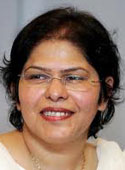

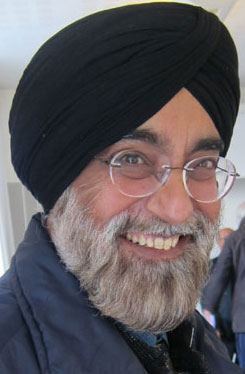

 The 2013 SASNET South Asia Symposium at Lund University will be held on Wednesday 24th april 2013, 09.00–19.00. The theme for the Symposium is ”The Wonder that is South Asia”, featuring eminent international scholars that will hold lectures on topics related to Bangladesh, India, Nepal, Pakistan and Sri Lanka. Venue: Palaestra, Universitetsplatsen, Lund.
The 2013 SASNET South Asia Symposium at Lund University will be held on Wednesday 24th april 2013, 09.00–19.00. The theme for the Symposium is ”The Wonder that is South Asia”, featuring eminent international scholars that will hold lectures on topics related to Bangladesh, India, Nepal, Pakistan and Sri Lanka. Venue: Palaestra, Universitetsplatsen, Lund.
 In a concluding panel discussion the Ambassadors of the South Asian nations represented in Sweden have been invited to participate in a dialogue with the speakers on the theme for the day – ”The Wonder that is South Asia”.
In a concluding panel discussion the Ambassadors of the South Asian nations represented in Sweden have been invited to participate in a dialogue with the speakers on the theme for the day – ”The Wonder that is South Asia”.
The Symposium is followed by a cultural programme at the same venue featuring the Flute player Shantala Subramanyam (photo).
The symposium hall has a limited capacity of seats. It is therefore necessary to register your participation no later than 10th April. More information with detailed programme.
The night before, Tuesday 23rd April, SASNET also co-organises a highly interesting Afghanistan seminar at Lund University. American photo journalist Ann Jones lectures on ”War Is Not Over When It’s Over. The Impact of War on Women in Afghanistan and Other Conflicts” – more information.
Monteiro and Jayasankar seminar in Lund on Indian documentary film
 Professors Anjali Monteiro and Kizhavana Jayasankar, researchers cum film makers from the Centre of Media and Cultural Studies, Tata Institute of Social Studies (TISS) in Mumbai, India, holds a seminar at Lund University on ”Indian Documentary: Diversity, Borders and Cultural Syncretism”, on Wednesday 10 April 2013, 13–15. The seminar is jointly organised by the Department of Media and Communication Studies, Lund University, in collaboration with SASNET. Venue: The Faculty Club, Centre for Languages and Literature (SOL-centrum), Helgonabacken 12, Lund. See poster.
Professors Anjali Monteiro and Kizhavana Jayasankar, researchers cum film makers from the Centre of Media and Cultural Studies, Tata Institute of Social Studies (TISS) in Mumbai, India, holds a seminar at Lund University on ”Indian Documentary: Diversity, Borders and Cultural Syncretism”, on Wednesday 10 April 2013, 13–15. The seminar is jointly organised by the Department of Media and Communication Studies, Lund University, in collaboration with SASNET. Venue: The Faculty Club, Centre for Languages and Literature (SOL-centrum), Helgonabacken 12, Lund. See poster.

 During the seminar, their documentary film ”So Heddan So Hoddan” (Like Here Like There) will be screened. The film focuses on the communities in Kachchh, Gujarat, India and across the border in Sindh (now in Pakistan). Many of their poems draw on the eternal love stories of /Umar-Marui/ and /Sasui-Punhu/, among others. These songs speak of the pain of parting, of the inevitability of loss and of deep grief that takes one to unknown and mysterious terrains. More information about the film.
During the seminar, their documentary film ”So Heddan So Hoddan” (Like Here Like There) will be screened. The film focuses on the communities in Kachchh, Gujarat, India and across the border in Sindh (now in Pakistan). Many of their poems draw on the eternal love stories of /Umar-Marui/ and /Sasui-Punhu/, among others. These songs speak of the pain of parting, of the inevitability of loss and of deep grief that takes one to unknown and mysterious terrains. More information about the film.
Monteiro and Jayasankar spends the month of April 2013 in Lund as scholarship holders through the Erasmus Mundus Action 2 mobility programme EMEA, that is coordinated by Lund University. Both of them are involved in media production, teaching and research. Jointly they have won twenty-eight national and international awards for their films. They have contributed to scholarly journals such as Cultural Studies, and both have been attached to Goldsmith’s College, London and the University of Western Sydney. They also serve as visiting faculty to several leading media and design institutions in India and abroad. They are both actively involved in ‘Vikalp‘ , which is a collective of documentary filmmakers campaigning for freedom of expression. They are also associated with various media and voluntary organisations.

 The American photo journalist Ann Jones holds a SASNET lecture on ”War Is Not Over When It’s Over. The Impact of War on Women in Afghanistan and Other Conflicts” at Lund University on Tuesday 23 April 2013,19.00–21.00, a seminar being organised in collaboration between SASNET and the Swedish Committee for Afghanistan (SCA) in Lund, with support from Sensus studieförbund. Venue: Auditorium (hörsalen), Centre for Languages and Literature (SOL-Centrum), Helgonabacken 12, Lund. See poster.
The American photo journalist Ann Jones holds a SASNET lecture on ”War Is Not Over When It’s Over. The Impact of War on Women in Afghanistan and Other Conflicts” at Lund University on Tuesday 23 April 2013,19.00–21.00, a seminar being organised in collaboration between SASNET and the Swedish Committee for Afghanistan (SCA) in Lund, with support from Sensus studieförbund. Venue: Auditorium (hörsalen), Centre for Languages and Literature (SOL-Centrum), Helgonabacken 12, Lund. See poster.
Ann Jones is a journalist and author of a number of non-fiction books about her research into women’s and humanitarian issues. She has also written and taken photographs for a number of publications including National Geographic Traveler and The New York Times. She is also a renowned authority on domestic violence, a startlingly original inquiry into the aftermath of wars and their impact on the least visible victims: women. Even after the definitive moments of military victory, women and children remain blighted by injury and displacement and are the most affected by the destruction of communities and social institutions. And along with peace often comes worsening violence against women, both domestic and sexual.
One of her books – ”Kabul in Winter” – dealt with Jones’ experiences in Afghanistan in 2002 and her observations of a city utterly destroyed by war, warlords and the Taliban where she felt a need to try to pick up the pieces. In her writings, Ann Jones enters the lives of everyday women and men and reveals through small events some big disjunctions: between the new Afghan ”democracy” and the still-entrenched warlords, between American promises and performance, between what’s boasted of and what is.
Research Community News

 The Swedish Research Council now invites applications for two research programmes of relevance to low- and middle- income countries, U-forsk (till last year administered by Swedish International Development Cooperation Agency Sida); and Swedish Research Links. Scientists within all academic areas are welcome to apply.
The Swedish Research Council now invites applications for two research programmes of relevance to low- and middle- income countries, U-forsk (till last year administered by Swedish International Development Cooperation Agency Sida); and Swedish Research Links. Scientists within all academic areas are welcome to apply.
U-forsk grants will be given to high quality research that is relevant to the overall goals of Swedish development cooperation, and the goals for global development policy. This means that the research should help creating conditions that will enable poor people to improve their lives, and/or contribute to an equitable and sustainable development. The grant can be used to cover any type of project-related costs and is awarded for a maximum of five years, beginning with the 2014 calendar year.
The Swedish Research Links programme offers grants for international collaborative research projects of high scientific quality and of mutual relevance for scientists in Sweden and scientists in Asia, the Middle East and North Africa, Africa, Latin America and Europe. In South Asia, Afghanistan, Bangladesh, Nepal, Pakistan, and Sri Lanka are eligible countries. The grant may be used for joint activities, such as research visits between the partners, workshops and seminars (but not for salaries or scholarships). The grant is awarded for a maximum of three years, beginning with the 2014 calendar year. Deadline for applications to both programmes is Wednesday 24th April 2013. Full information.



 The Afghanistan Centre at Kabul University (ACKU) was established in Peshawar, Pakistan in 1989, as an initiative by Nancy Hatch Dupree (photo), inspired by the work and vision of her late ethnographer and archaeologist husband Louis Dupree. The Centre was shifted to Kabul University in 2006, and in mid-February 2013, ACKU moved into new premises in a building right at the heart of the Kabul University campus. The Centre is regarded as the richest source of information in the region. Its overall purpose is to enhance nation building by providing reliable information to policy planners, strategy makers, program implementers and future leaders of Afghanistan, including the faculty and students at Kabul University.
The Afghanistan Centre at Kabul University (ACKU) was established in Peshawar, Pakistan in 1989, as an initiative by Nancy Hatch Dupree (photo), inspired by the work and vision of her late ethnographer and archaeologist husband Louis Dupree. The Centre was shifted to Kabul University in 2006, and in mid-February 2013, ACKU moved into new premises in a building right at the heart of the Kabul University campus. The Centre is regarded as the richest source of information in the region. Its overall purpose is to enhance nation building by providing reliable information to policy planners, strategy makers, program implementers and future leaders of Afghanistan, including the faculty and students at Kabul University.
The ACKU Collection contains books, reports, maps, newspapers, journals, periodicals, posters, pamphlets, a rare collection of the Mujahideen and Taliban press, bibliographies, videos, audiocassettes and DVDs. Many documents relate to NGO and UN agency surveys and programs compiled over the past 30 years. Specific subjects include data on Afghanistan’s economy, political history and parties the refugee crisis of the 1980s and 90s, as well as analytical and descriptive writings on health, education, agriculture, veterinary sciences and animal husbandry, women, children, law, music, folklore and archaeology, history, political science, monuments, literature, language and other aspects of cultural heritage, including information on historical buildings.
The University of Arizona Libraries in partnership with the Afghanistan Centre at Kabul University (ACKU) collaborate on preserving and creating worldwide access in digital format to unique Afghan records from ACKU’s permanent collections related to Afghanistan’s history and culture.
More information on ACKU web site.
Read an article on the founder/director Nancy Hatch Dupree, entitled ”From Kabul love affair to Afghanistan’s first centre for study of its history”, published in The Guardian 26 March 2013.

The Human Development Report 2013 was launched on 15 March 2013. The report, The Rise of the South: Human Progress in a Diverse World examines the profound shift in global dynamics driven by the fast-rising new powers of the developing world and its long-term implications for human development. China has already overtaken Japan as the worlds second biggest economy while lifting hundreds of millions of its people out of poverty. India is reshaping its future with new entrepreneurial creativity and social policy innovation. Brazil is lifting its living standards through expanding international relationships and antipoverty programs that are emulated worldwide. But the “Rise of the South” analyzed in the Report is a much larger phenomenon: Turkey, Mexico, Thailand, South Africa, Indonesia and many other developing nations are also becoming leading actors on the world stage. More information about HDR 2013.
 As usual a comparative Human Development Index is included in the report. It gives statistical comparisions between 187 countries of the world. Just like in last years, the current year’s figures are complimented by a trends analysis for the period back to 1980.
As usual a comparative Human Development Index is included in the report. It gives statistical comparisions between 187 countries of the world. Just like in last years, the current year’s figures are complimented by a trends analysis for the period back to 1980.
The overall trend curves for the South Asian region however show a steady improvement during the period 1980-2013 (see figure to the right).
In the HDR 2013, Sri Lanka still ranks highest as no. 92, unchanged position, being the only South Asian nation to be included in the High Human Development category of nations.
Maldives ranks second, as no. 104, down by 1 position since last year, and India is ranked as no. 136, both in the Medium Human Development category of nations, to which also Bhutan (position 140) belong.
Next comes Pakistan and Bangladesh, ranked to share the position no. 146, belonging to the Low Human Development category of nations, along with Nepal (position 157); and Afghanistan (position 175.
Just like previous years Norway tops the worldwide HDI list, this year before Australia and the United States. Sweden ranks as no. 7 (same as last year).
Study the Human Development Index 2013.
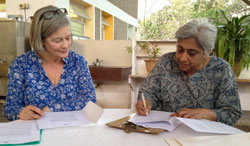 University of Gothenburg is involved in a collaboration with Srishti University of Art, Design and Technologyin Bangalore, India. Two MoUs were signed in February 2012, one between Anna Lindahl, Dean, Faculty of Performing Arts, GU, and Geetha Narayanan, Rector, Srishti, formalising the collaboration (photo to the left), and a second between representatives of the Faculty of Arts and Srishti.
University of Gothenburg is involved in a collaboration with Srishti University of Art, Design and Technologyin Bangalore, India. Two MoUs were signed in February 2012, one between Anna Lindahl, Dean, Faculty of Performing Arts, GU, and Geetha Narayanan, Rector, Srishti, formalising the collaboration (photo to the left), and a second between representatives of the Faculty of Arts and Srishti.
The ambition in the first case is to launch joint research projects in Design and Crafts, and prepare a major research application on issues related to Cultural Heritage, Identity and Museums in Karnataka and wesetern Sweden.Srishti is an experimental and teaching-focused school of art and design, founded in 1996 by the not-for-profit Ujwal Trust. Srishti provides its students a self-initiated, self-directed and self-assessed learning environment, with curricula integrating multiple disciplines with an arts foundation. Srishti offers undergraduate and graduate programs. It has specializations in Textile Design, Product and Interface Design, Visual Communication Design, Independent and Broadcast Media (Film and Video) and Furniture and Interior Design.
The collaboration focuses on Critical Heritage Studies (CHS), a priority research area at the University of Gothenburg – more information, involving the four faculties of Humanities; Science; Arts; and Fine, Applied and Performing Art. The collaboration, that also involves the Region of Västra Götaland, and the Institute of Textiles in Borås, is carried out within the framework of University of Gothenburg’s Go:India Project.

 At Srishti the corresponding partner institution is the Aesthetics and Critical Studies Program, headed by Dr. Vasanthi Mariadass (photo). spent two months as a guest researcher at University of Gothenburg in May-June 2012. She was jointly invited by the faculties of Fine, Applied and Performing Arts; and Arts, and worked on a book project about the film maker Harun Farocki, and was based at V:ARC – Valand Artistic Research Centre. Vasanthi did her DAAD research stay at Asian Studies Department, Humboldt University, Berlin in 2011. Her teaching experience include both in the US and in India. She was a research fellow at Indian institute of Science, Bangalore 2008-2009). More information.
At Srishti the corresponding partner institution is the Aesthetics and Critical Studies Program, headed by Dr. Vasanthi Mariadass (photo). spent two months as a guest researcher at University of Gothenburg in May-June 2012. She was jointly invited by the faculties of Fine, Applied and Performing Arts; and Arts, and worked on a book project about the film maker Harun Farocki, and was based at V:ARC – Valand Artistic Research Centre. Vasanthi did her DAAD research stay at Asian Studies Department, Humboldt University, Berlin in 2011. Her teaching experience include both in the US and in India. She was a research fellow at Indian institute of Science, Bangalore 2008-2009). More information.
The first joint activity consisted of a conference on “Identities and Resistance: Heritage” that was held at Srishti in Bangalore 22 – 25 February 2012. The conference aimed at working with the national museums as a part of public space, public life, places of memory and identity building. The Swedish organisers were Johan Öberg, Lecturer at the Valand Academy, part of Universty of Gothenburg, and also being the research secretary of the Faculty of Fine, Applied and Performing Arts; and Sigríður Beck from the Division of History and International coordinator at the Faculty of Arts. More information.
A new joint workshop will be held in Bangalore 17–22 April 2013, to plan for common research projects in various fields. Both Margareta Hallberg, Dean of the Faculty of Arts, and Ingrid Elam, new Dean, Faculty of Performing Arts, GU, will participate, as well as Sigridur Beck; Johan Öberg; Katarina Karlsson from Valand, Anders Hagberg from the Academy of Music and Drama (HSM); and Mattias Bäckström from History of Ideas and Science, Department of Literature, History of Ideas, and Religion (LIR).
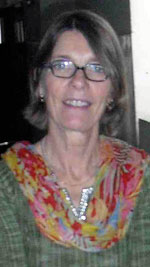 Division of Physiotherapy at Karolinska Institutet (KI). Contact person: Dr. Kristina Kindblom, Lecturer at KI, but also Guest Professor at Pravara Institute of Medical Sciences Deemed University (PIMS), Loni, Ahmednagar Dist, Maharashtra, India.
Division of Physiotherapy at Karolinska Institutet (KI). Contact person: Dr. Kristina Kindblom, Lecturer at KI, but also Guest Professor at Pravara Institute of Medical Sciences Deemed University (PIMS), Loni, Ahmednagar Dist, Maharashtra, India.
Karolinska Institutet and Pravara Institute of Medical Science are both member universities of an ongoing Indo-European Erasmus Mundus Action 2 mobility programme, that was decided upon by the European Commission in 2008. More information about the programme (coordinated by Lund University, running till 2013). After spending time as an academic staff at Pravara Institute in the fall 2009 on an Erasmus Mundus scholarship, Kristina Kindblom has worked as Guest Professor at Pravara for three-four months every year since 2010. Next, she will spend two months at Pravara in Octber-November 2013. Her teaching initially focused on how to assist physical movements of patients with disabilities to move independently, has gradually developed with implementing knowledge into clinical practice both for students, providers and relatives. On behalf of Professor Somasundaram at PIMS, Kristina has also been involved in writing a proposal on how physiotherapists could be involved in a Slum Project to promote health in aged people.

 The Division of Physiotherapy has also been involved in a Linnaeus Palme exchange collaboration programme since 2011, involving exchange of both faculty and students in both directions. Two students from KI took part in the collaboration at PIMS during four weeks in October-November 2012. They participated in a Certificate Course in Social Health and Development and took part in the Physiotherapy programme practically and theoretically. Two teachers from PIMS will visit KI during three weeks in May 2013. They will teach and be involved in the international CHBR course, 7,5 ECTS credits by contributing in discussions. (The Swedish presence is also cultural, see photo from Lucia celebrations at Pravara.) More information about South Asia related activities at Division of Physiotherapy, Karolinska Institutet.
The Division of Physiotherapy has also been involved in a Linnaeus Palme exchange collaboration programme since 2011, involving exchange of both faculty and students in both directions. Two students from KI took part in the collaboration at PIMS during four weeks in October-November 2012. They participated in a Certificate Course in Social Health and Development and took part in the Physiotherapy programme practically and theoretically. Two teachers from PIMS will visit KI during three weeks in May 2013. They will teach and be involved in the international CHBR course, 7,5 ECTS credits by contributing in discussions. (The Swedish presence is also cultural, see photo from Lucia celebrations at Pravara.) More information about South Asia related activities at Division of Physiotherapy, Karolinska Institutet.
SASNET tries to keep track of all South Asia related research at the Swedish universities, and in our database we have information about approximately 300 departments where some kind of South Asia related research and/or educational collaboration projects with institutions in the eight South Asian nations is going on. Among our networking partners , we will each month present one or two of these departments and the researchers working on South Asia related projects. Go for SASNET’s list of Swedish departments.

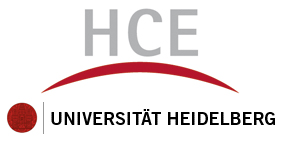 The Heidelberg Center for the Environment (HCE) at Heidelberg University, Germany invites applications for a Doctoral Fellowship in South Asian History Early Modern History / Environmental History within the Junior Research Group (JRG) “Environment and Society. Facing Famine in the Early Modern World”. The position will start on May 1st 2013 or as soon as possible thereafter, and is awarded for 3 years (2+1).
The Heidelberg Center for the Environment (HCE) at Heidelberg University, Germany invites applications for a Doctoral Fellowship in South Asian History Early Modern History / Environmental History within the Junior Research Group (JRG) “Environment and Society. Facing Famine in the Early Modern World”. The position will start on May 1st 2013 or as soon as possible thereafter, and is awarded for 3 years (2+1).
The JRG investigates the co-development and entanglement of society and environment focussing on early modern food crises. The JRG is interdisciplinary in scope and combines approaches of environmental history, historical climatology, social ecology and postcolonial studies. The successful applicant will be expected to complete a PhD dissertation on 18th century famines focussing on the Indian subcontinent and contribute to the group’s scientific activities.
Successful applicants will hold a Master’s degree in Indian/South Asian studies, history, cultural anthropology or a related discipline and have received substantial training in archival research and ethnographic methods. Very good spoken and written English is required. Proficiency in Bengali and/or Farsi is advantageous.
Deadline for applications is April 15th 2013, though applications will be accepted until the position is filled. More information.

 The Centre for Modern Indian Studies at the Georg-August-Universität in Göttingen, Germany, seeks to fill the position of a Post-Doctoral Fellow in Indian Religions. This position will begin on 1 October 2013 and is full time on a two-year fixed-term contract. Application deadline is 25 April 2013.
The Centre for Modern Indian Studies at the Georg-August-Universität in Göttingen, Germany, seeks to fill the position of a Post-Doctoral Fellow in Indian Religions. This position will begin on 1 October 2013 and is full time on a two-year fixed-term contract. Application deadline is 25 April 2013.
Applications from scholars representing all subfields in the study of religions in India are welcome; preference will be given to candidates whose research and writing addresses one or more of the following topics: minority religions, law, conversion, gender, social inequality, religion and empire, and religion and democratic practice. Applicants must have a PhD in a relevant field, such as Religious Studies, History, Anthropology, Sociology, South Asian Studies, or Political Science. In addition to pursuing a postdoctoral research project, the fellow will assist in the design and organization of conferences and workshops on Indian religions, and in the teaching of religion courses at the Centre for Modern Indian Studies. The scholar will be based at the University of Goettingen in Germany, but may spend a portion of the fellowship period conducting field research, in consultation with the Indian Religions research group leader. Applicants from all countries are encouraged to apply. English proficiency is expected, German is not required but welcomed. More information.

 The Department of Biotechnology, Government of India (DBT), VINNOVAand the Swedish Research Council (SRC) has announced a Joint Indo-Swedish Innovation Call for Health and Disease prevention. The goal is to support long-term Indo-Swedish research and innovation collaboration in the field of Health and Indian and Swedish industry and researchers inboth private and public sectors are invited to submit joint project applications for collaborative research and innovation projects. The joint call will stimulate R&D projects in companies and at universities, to longterm development of strong research and innovation environments in a number of broad scientific areas. The approach is to establish and strengthen collaborative industry and research networks between India and Sweden by funding joint research and innovation projects, exchange visits, demonstration and proof of principle. Collaborative research and innovation projects should be set up under one or more of the following health areas, and should provide economical, societal and environmentally sustainable solutions: Determinants of health and disease prevention, developing treatments and treating disease; Medical diagnostics; Innovative food, improving health promotion and disease prevention; Medical devices; and Antimicrobial resistance. In the area of antimicrobial resistance basic research initiatives are welcome to present proposals.
The Department of Biotechnology, Government of India (DBT), VINNOVAand the Swedish Research Council (SRC) has announced a Joint Indo-Swedish Innovation Call for Health and Disease prevention. The goal is to support long-term Indo-Swedish research and innovation collaboration in the field of Health and Indian and Swedish industry and researchers inboth private and public sectors are invited to submit joint project applications for collaborative research and innovation projects. The joint call will stimulate R&D projects in companies and at universities, to longterm development of strong research and innovation environments in a number of broad scientific areas. The approach is to establish and strengthen collaborative industry and research networks between India and Sweden by funding joint research and innovation projects, exchange visits, demonstration and proof of principle. Collaborative research and innovation projects should be set up under one or more of the following health areas, and should provide economical, societal and environmentally sustainable solutions: Determinants of health and disease prevention, developing treatments and treating disease; Medical diagnostics; Innovative food, improving health promotion and disease prevention; Medical devices; and Antimicrobial resistance. In the area of antimicrobial resistance basic research initiatives are welcome to present proposals.
Project proposals are requested to include a Public-Private Partnership (PPP) perspective in the application. The programme encourages cooperation between industry, academia and the public sector to ensure maximum relevance and impact. Contact Johanna Ulfvarson or Tomas Aronsson for more information or see the full call text. Last day for submitting proposals is April 29, 2013.

 The 23rd European Conference on South Asian Studies (ECSAS) will take place on 23 to 26 July 2014 at the University of Zurich in Switzerland. The call for panels is now open and will close on 30th April 2013. Proposals should consist of • panel title; • name of panel convenor or convenors, • short abstract of less than 300 characters, and • long abstract of less than 250 words, preferably including names of tentative
The 23rd European Conference on South Asian Studies (ECSAS) will take place on 23 to 26 July 2014 at the University of Zurich in Switzerland. The call for panels is now open and will close on 30th April 2013. Proposals should consist of • panel title; • name of panel convenor or convenors, • short abstract of less than 300 characters, and • long abstract of less than 250 words, preferably including names of tentative
panellists.
The EASAS appreciates a well-balanced composition of convenors and panellists within a panel (by gender, with an international mix of participants, and senior and junior scholars) but the main criterion will be the high academic quality of your panel. One of the convenors must be based in a European institution. The conference organisers will also seek to ensure that the wide range of disciplines usually represented at the conference finds adequate coverage,
both separately and in interdisciplinary panels.
If you would like to convene a panel at this conference, please submit your proposal via the online form at www.nomadit.co.uk/easas/ecsas2014. The Steering Committee decisions will be published on 15th June 2013.
The ECSAS has met regularly since 1968, and has provided an important opportunity to discuss current research and scholarship on topics relating to South Asia within the humanities and social sciences. The ECSAS conferences now operate under the auspices of the European Association for South Asian Studies (EASAS), a charitable, academic association engaged in the support of research and teaching concerning South Asia with regard to all periods and fields of study. The hosts for the 23rd ECSAS are the Department of Geography and the University Research Priority Program (URPP) Asia and Europe, both at the University of Zurich.
Conference convenors are Prof. Dr. Ulrike Müller-Böker, Department of Geography, University of Zurich (CH); and Prof. Dr. Angelika Malinar, Department of Indology; Academic Director University Research Priority Program Asia and Europe, University of Zurich (CH).
Participants cannot submit more than one presentation during the 23rd ECSAS. Beyond that, each participant may chair one panel; or be discussant in one panel. ECSAS requires all accepted panels to be open to paper proposals through the website: proposed panels should not be ‘closed’ to further papers ab initio. The organisers encourage young researchers to contact panel convenors to be considered for inclusion in their panel; young researchers are also encouraged to propose panels themselves. No panel may run for more than 3 sessions of 90 minutes.
According to the decision of EASAS members, panel convenors and paper presenters at the 23rd ECSAS must be members of EASAS through 2013 and 2014. Non-members cannot attend the conference. It is easy to join EASAS through the following link: www.easas.org/Becomeamember
If after reading www.nomadit.co.uk/easas/ecsas2014 you have queries, please email: ecsas2014@nomadit.co.uk.
Welcome to Zurich in 2014!
The Department of Political Science, Faculty of Social Sciences, University of Copenhagen, invites applications for a position as Associate Professor in Political Science. The position is open for political scientists with specialization in Asian politics and/or international relations. The position is available from September 1 2013 or as soon as possible thereafter. Appointment as Associate Professor requires research and teaching qualifications at the level that can be achieved by satisfactorily completing a period of employment at the level of assistant professor or equivalent. Research and teaching in Asia-related issues are required to become qualified for the position. The ability to teach other areas of political science will be seen as an important qualification. The deadline for applications including enclosures was 1 April 2013. More information.

 The Swedish International Center for Local Democracy (ICLD) seeks research proposals on Local Democracy in a number of low and middle-income countries worldwide, including India. Grants may be up to 700 000 SEK per proposal and year during the period of 2013 to 2015 (provided that ICLD will be allocated funds by the Swedish International Development Coopeartion Agency, Sida). A project may be supported for one, two or three years. Research proposals and applications for grants should be submitted not later than April 30, 2013.
The Swedish International Center for Local Democracy (ICLD) seeks research proposals on Local Democracy in a number of low and middle-income countries worldwide, including India. Grants may be up to 700 000 SEK per proposal and year during the period of 2013 to 2015 (provided that ICLD will be allocated funds by the Swedish International Development Coopeartion Agency, Sida). A project may be supported for one, two or three years. Research proposals and applications for grants should be submitted not later than April 30, 2013.
The ICLD’s purpose, as part of Swedish development co-operation, is to promote local democracy in low and middle-income countries. In this context, local democracy principally concerns decentralization, strengthening of local institutions, human rights and collaboration between local actors. Decentralization entails devolution of finance, functionaries, and decision making power to local elected political bodies, both rural and urban. Combating poverty through a rights-based and participatory approach is a priority. Capacity building is a key word. ICLD calls for research projects of relevance to local politicians, civil servants and citizens striving to improve local democracy.
In Asia, research focusing on the following countries are eligible for ICLD funding: India, Indonesia, China and Vietnam.
Full information.
Educational News

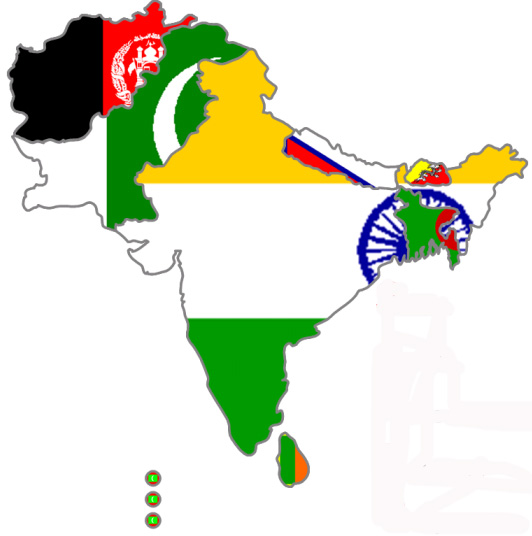 In mid-March 2013, the Swedish International Programme Office for Education and Training decided upon the thirteenth round of Linnaeus Palme Exchange Programme grants, for the period 1 July 2013 – 30 June 2014. A total amount of SEK 42 Million will be distributed to 214 educational academic collaboration projects. The grants are funded by the Swedish International Development Cooperation Agency (Sida). Out of 214 projects given grants, 2 relates to collaboration with university departments in Bangladesh, 22 with India, 3 with Nepal, and 2 with Sri Lanka. Please note that SASNET provides additional value. Not only do we provide the decisions proper, but for most of the Swedish departments involved, SASNET has produced specially designed presentation pages with detailed information about the researchers and teachers involved in South Asia related projects within the specific department. (Altogether SASNET currently provides extensive information about South Asia projects at more than 300 Swedish university departments, a unique material, go for it.
In mid-March 2013, the Swedish International Programme Office for Education and Training decided upon the thirteenth round of Linnaeus Palme Exchange Programme grants, for the period 1 July 2013 – 30 June 2014. A total amount of SEK 42 Million will be distributed to 214 educational academic collaboration projects. The grants are funded by the Swedish International Development Cooperation Agency (Sida). Out of 214 projects given grants, 2 relates to collaboration with university departments in Bangladesh, 22 with India, 3 with Nepal, and 2 with Sri Lanka. Please note that SASNET provides additional value. Not only do we provide the decisions proper, but for most of the Swedish departments involved, SASNET has produced specially designed presentation pages with detailed information about the researchers and teachers involved in South Asia related projects within the specific department. (Altogether SASNET currently provides extensive information about South Asia projects at more than 300 Swedish university departments, a unique material, go for it.
Among new South Asia related projects being provided grants could be mentioned collaboration initiated between Department for Social Sciences at Ersta Sköndal Högskola/Loyola College for Social Sciences; Centre of Gender Studies, Lund University/Delhi School of Economics; School of Business, Society and Engineering, Mälardalens Högskola/Indian Institute of Technology Bombay; and Department of Forest Resource Management, Swedish University of Agricultural Sciences/Forest Research Institute University, Dehradun. More information about the South Asia related 2013/14 Linnaeus Palme grants.
 For the eighth year, the Leiden Summer School in Languages and Linguistics at the Faculty of Arts, Leiden University, the Netherlands offers an Indological Programme during the period 15-26 July 2013. The Indological programme consists of four courses: – Features of Vedic poetry , and – The syntax of Vedic prose, both courses taught by Dr. Werner Knobl, University of Kyoto, Japan; a course on ”Readings in Buddhist Sanskrit: Selected passages from the Mahāvastu”, taught by
For the eighth year, the Leiden Summer School in Languages and Linguistics at the Faculty of Arts, Leiden University, the Netherlands offers an Indological Programme during the period 15-26 July 2013. The Indological programme consists of four courses: – Features of Vedic poetry , and – The syntax of Vedic prose, both courses taught by Dr. Werner Knobl, University of Kyoto, Japan; a course on ”Readings in Buddhist Sanskrit: Selected passages from the Mahāvastu”, taught by
Vincent Tournier, Leiden University; and a course on ”Readings in the Purāṇas: manuscripts and critical editions”, taught by Peter Bisschop, Leiden University.
This year, the Summer School consists of totally nine programmes, all taught by internationally renowned specialists. The programmes include one Indo-European Programme for beginners, and another Indo-European Programme for advanced students. More information.
• Other educational news connected to South Asian studies all over the World
See SASNET’s page, http://www.sasnet.lu.se/education-news
Seminars and Conferences in Scandinavia

 The Dalit Solidarity Network Norway and the Initiative for Ethical Trade Norway invites to a half-day workshop in Oslo entitled ”Better Business without Caste Discrimination” on Friday 5 April 2013, 10.00–15.00. Venue: Miljøhuset, Grensen 9, Oslo. Surinder Jodhka, Professor of Sociology at Jawaharlal Nehru University in Delhi (and currently ICCR Visiitng India Chair Professor at Lund University) will hold a keynote lecture entitled ”Engaging with Caste in Contemporary India: Changes and Reproduction of Social Inequality”. The workshop also includes lectures by Dr. Christodas Gandhi, Dalit IAS Officer, and retired Commissioner for Development and Planning in Tamil Nadu, and Gerard Oonk, Director of India Committee of The Netherlands and Dalit Solidarity Network-Netherlands. More information.
The Dalit Solidarity Network Norway and the Initiative for Ethical Trade Norway invites to a half-day workshop in Oslo entitled ”Better Business without Caste Discrimination” on Friday 5 April 2013, 10.00–15.00. Venue: Miljøhuset, Grensen 9, Oslo. Surinder Jodhka, Professor of Sociology at Jawaharlal Nehru University in Delhi (and currently ICCR Visiitng India Chair Professor at Lund University) will hold a keynote lecture entitled ”Engaging with Caste in Contemporary India: Changes and Reproduction of Social Inequality”. The workshop also includes lectures by Dr. Christodas Gandhi, Dalit IAS Officer, and retired Commissioner for Development and Planning in Tamil Nadu, and Gerard Oonk, Director of India Committee of The Netherlands and Dalit Solidarity Network-Netherlands. More information.

 The World Maritime University (WMU) in Malmö organises an International Conference on Ship Recycling (SHIPREC2013) on 7–9 April 2013. Recycling is undoubtedly the most environmentally friendly way to dispose of ships at the end of their operational lives. Nearly all of the materials on board can be recycled, reused, or refurbished. Ship recycling is faced with numerous challenges and there is growing public awareness of the associated environmental, safety, and health hazards. The issue calls for continued scrutiny and debate.
The World Maritime University (WMU) in Malmö organises an International Conference on Ship Recycling (SHIPREC2013) on 7–9 April 2013. Recycling is undoubtedly the most environmentally friendly way to dispose of ships at the end of their operational lives. Nearly all of the materials on board can be recycled, reused, or refurbished. Ship recycling is faced with numerous challenges and there is growing public awareness of the associated environmental, safety, and health hazards. The issue calls for continued scrutiny and debate.
International and non-governmental organizations, governments, shipowners, shipyards, classification societies, universities, and research institutes are among the many entities anticipated to participate in the Malmö conference. SHIPREC 2013 will afford the opportunity to share knowledge and information and exchange innovative ideas and solutions. More information.

 The Department of Culture Studies and Oriental Languages (IKOS) at University of Oslo invites to three Fokus INDIA: Oslo Morgenstierne Lectures addressing topics related to India’s past and present, politics, religions and cultures on 9–11 April 2013, every day 16.15–18.00. They are delivered by Elisabeth Schömbucher-Kusterer from the Department of Indology, University of Würzburg, Germany. On Tuesday 9 April she will speak about ”Gods, Ghosts and Demons. Possession and Trance in India and Europe”, on Wednesday 10 April she will speak about ”Spirit Possession, Exorcism and other Forms of Therapy”, and on Thursday 11 April she will talk about ”Possession Mediumship and its Ritual Discourse”. All lectures will be held at room 11, P.A. Munchs hus, Blindern, Oslo. All are welcome. More information.
The Department of Culture Studies and Oriental Languages (IKOS) at University of Oslo invites to three Fokus INDIA: Oslo Morgenstierne Lectures addressing topics related to India’s past and present, politics, religions and cultures on 9–11 April 2013, every day 16.15–18.00. They are delivered by Elisabeth Schömbucher-Kusterer from the Department of Indology, University of Würzburg, Germany. On Tuesday 9 April she will speak about ”Gods, Ghosts and Demons. Possession and Trance in India and Europe”, on Wednesday 10 April she will speak about ”Spirit Possession, Exorcism and other Forms of Therapy”, and on Thursday 11 April she will talk about ”Possession Mediumship and its Ritual Discourse”. All lectures will be held at room 11, P.A. Munchs hus, Blindern, Oslo. All are welcome. More information.

 The Danish Institute for International Studies (DIIS) and the Danish Ministry of Foreign Affairs invite to a conference on “Afghanistan Towards 2014 ─ Prospects for Development, Security and a National Political Settlement”, Thursday, 11 April 2013, 08.30-16.15 at Christiansborg (Danish Parliament), Fællessalen, Visitors Entrance, 1240 Copenhagen.
The Danish Institute for International Studies (DIIS) and the Danish Ministry of Foreign Affairs invite to a conference on “Afghanistan Towards 2014 ─ Prospects for Development, Security and a National Political Settlement”, Thursday, 11 April 2013, 08.30-16.15 at Christiansborg (Danish Parliament), Fællessalen, Visitors Entrance, 1240 Copenhagen.
This conference on state building in Afghanistan pulls together high-level Afghan and Danish Ministers, leading civil society representatives and outstanding experts in a discussion of the prospects and challenges of Afghanistan after 2014. The vast majority of international forces will have left the country by then and the military pull-out will expectedly mark a new chapter in Afghan history. The challenges and prospects for Afghanistan after 2014 depend on how the development on many different levels turns out: Will the Afghan National Security Forces be ready to fill out their intended role as security providers? What would be the outcome of the Presidential elections in 2014 and the hesitant steps towards national reconciliation? How can the regional dynamics and power games be expected to affect the prospects for peace and stability in Afghanistan? And not least, how can the Afghan power holders and the international community cultivate sustainable development in Afghanistan in order to make the country more resilient towards violent conflict and less dependent on international aid?
Participation is free of charge and includes lunch. Due to security restrictions registration is required no later than Thursday, 4 April 2013 at 12.00 noon. More information and registration.

 Uppsala Centre for Sustainable Development (UCSD) at Uppsala University organises an international conference on “Claiming the City: Civil Society Mobilisation by the Urban Poor”on 16–17 April 2013. It is co-organised by the Swedish International Development Cooperation Agency (Sida) and the Dag Hammarskjöld Foundation. Venue: Missionskyrkan, S:t Olofsgatan 40, Uppsala.
Uppsala Centre for Sustainable Development (UCSD) at Uppsala University organises an international conference on “Claiming the City: Civil Society Mobilisation by the Urban Poor”on 16–17 April 2013. It is co-organised by the Swedish International Development Cooperation Agency (Sida) and the Dag Hammarskjöld Foundation. Venue: Missionskyrkan, S:t Olofsgatan 40, Uppsala.
 Half of the world’s population lives in cities, and a growing proportion – today one billion – lives in “slums” and informal settlements. Many of the urban poor engage in collective strategies to secure their housing, earn a living, and defend their interests. Their claims on the city often conflict with the demands of other urban groups over access to resources, space, and power. They also challenge the definitions of urban authorities and city planners regarding which claims are to be seen as legitimate.
Half of the world’s population lives in cities, and a growing proportion – today one billion – lives in “slums” and informal settlements. Many of the urban poor engage in collective strategies to secure their housing, earn a living, and defend their interests. Their claims on the city often conflict with the demands of other urban groups over access to resources, space, and power. They also challenge the definitions of urban authorities and city planners regarding which claims are to be seen as legitimate.
This conference will focus on informal and formalised networks and associations of urban poor – as well as other civil society organisations working in support of their claims – and their significance for strengthening people’s political, social and economic position in the city.
Since the subject asks for breaching the divide between research and practice, researchers, students, actors within international development cooperation, activists, and others with interest in the issues are equally invited to participate. More information.



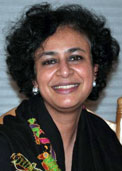 The Asian Dynamics Initiative at University of Copenhagen organises a public lecture by Tulasi Srinivas, Associate Professor of Anthropology, Emerson College, Boston, USA, on Thursday 18 April 2013, 15.15–17.00. She will speak about ”Newness, Ritual and Globalization in Urban Hindu Temple Publics”. The seminar is co-organised by the Modern India and South Asia Studies. Venue: Room 27.0.09, Building 27, Faculty of Humanities, Njalsgade 136, Copenhagen. Tulasi Srinivas is currently on a Research fellowship at The Kate Hamburger Kolleg Center for Religious Studies (CERES), at Ruhr Universität Bochum, Germany. Srinivas is a specialist on globalization, culture and religion. Her work brings together key contemporary concerns of the global political economy, spirituality, and ethical life. The author of “Winged Faith Rethinking Globalization and Religious Pluralism” Columbia University Press, 2010, and co-editor (with Krishnendu Ray) of “Curried Cultures: Food, Globalization and South Asia“, University of California Press, 2012, Srinivas is currently completing another monograph “Forging Faith: Ambivalent Globalization and Innovative Religion in Hindu Temple Publics of Bangalore City.” More information.
The Asian Dynamics Initiative at University of Copenhagen organises a public lecture by Tulasi Srinivas, Associate Professor of Anthropology, Emerson College, Boston, USA, on Thursday 18 April 2013, 15.15–17.00. She will speak about ”Newness, Ritual and Globalization in Urban Hindu Temple Publics”. The seminar is co-organised by the Modern India and South Asia Studies. Venue: Room 27.0.09, Building 27, Faculty of Humanities, Njalsgade 136, Copenhagen. Tulasi Srinivas is currently on a Research fellowship at The Kate Hamburger Kolleg Center for Religious Studies (CERES), at Ruhr Universität Bochum, Germany. Srinivas is a specialist on globalization, culture and religion. Her work brings together key contemporary concerns of the global political economy, spirituality, and ethical life. The author of “Winged Faith Rethinking Globalization and Religious Pluralism” Columbia University Press, 2010, and co-editor (with Krishnendu Ray) of “Curried Cultures: Food, Globalization and South Asia“, University of California Press, 2012, Srinivas is currently completing another monograph “Forging Faith: Ambivalent Globalization and Innovative Religion in Hindu Temple Publics of Bangalore City.” More information.

The Department of Literature, History of Ideas, and Religion at University of Gothenburg organizes a Symposium on Indian Culture and Society, on Friday 19 April 2013, 13.00–17.15. The programme includes lectures by two of the current Indian Council for Cultural Relations (ICCR) Visiting Indian Professors in Sweden, namely Surinder Jodhka, ICCR guest professor at Lund University, who will speak about ”The future of caste and power”; and Ashok Kaul, ICCR guest professor at the University of Gothenburg, who will speak about ”Kashmir – a road forward”. Venue: Humanisten, Renströmsgatan 6, room to be announced later.
The programme also includes a presentation by Ms. Anette Pooja on ”Studying Indian dance as a Western
woman”, by Dr. Shashank Srivastava on ”Indian philosophy and post-modernism”, and Associate Professor Clemens Cavallin on ”Teaching Hinduism as a Western scholar”. In order to participate you have to register by sending an e-mail to Clemens Cavallinno later than 5 April 2013. More information.



 |
 |
 |
An open seminar on ”Indian Cultures and Diasporas” will be held at Lund University on Monday 17 June 2013, 15.00–19.00. It is jointly organized by SASNET, the Nordic Centre in India (NCI), and Lund University’s Centre for Theology and Religious Studies (CTR). Venue: CTR, Room 118, Allhelgona Kyrkogata 8, Lund.
Invited guest speakers are Professor Gurinder Singh Mann from the Center for Sikh and Punjab Studies at University of Californa, Santa Barbara, USA, who will speak about “The Sikh Panth: From Kartarpur to Anandpur (1500-1700)”; Dr. Amit Kumar Mishra from the Centre for the Study of Indian Diaspora at University of Hyderabad, India, who will give a lecture on ”Indians in Diaspora: A Social-Cultural Continuum?”; and Dr. Gibb Schreffler from Pomona College in Claremont, California, USA, who will speak about ”The Punjab Dhol (Drum) Tradition and its Modernization in Post-Indenpendence Indian Punjab”. The seminar will also include a screening of the documentary film “The Sikhs of Kabul: A Forgotten Community” directed by Mr. Bobby Singh Bansal in 2012. The film is about Afghan Sikhs who have been a part of the culture and heritage of Afghanistan since the seventeenth century and how they have been caught in political crossfire since the rise of the Taliban regime to power in 1992.
The seminar is arranged in connection with the conference ”Young Sikhs in a Global World: Negotiating Identity, Tradition and Authority” held in Lund 18–19 June 2013 at the Centre for Theology and Religious Studies, Lund University. More information about the conference.
 The Asian Art and Performance Consortium (AAPC) of the Academy of Fine Arts (Kuva) and the Finnish Theatre Academy Helsinki (Teak) will host a symposium focusing on manifestations of sex and gender in Asian art and performance: “Shifting Dialogues II: Objects of Desire: Sexual Artifice in Asian Art and Performance”, to be held during October 17-19, 2013 at the University of the Arts, Helsinki, Finland. This is the second symposium organised under the ongoing research project, Shifting Dialogues – Asian Performance and Fine Arts. The project is funded by the Academy of Finland in 2011-2014.
The Asian Art and Performance Consortium (AAPC) of the Academy of Fine Arts (Kuva) and the Finnish Theatre Academy Helsinki (Teak) will host a symposium focusing on manifestations of sex and gender in Asian art and performance: “Shifting Dialogues II: Objects of Desire: Sexual Artifice in Asian Art and Performance”, to be held during October 17-19, 2013 at the University of the Arts, Helsinki, Finland. This is the second symposium organised under the ongoing research project, Shifting Dialogues – Asian Performance and Fine Arts. The project is funded by the Academy of Finland in 2011-2014.
 This time the focus of the symposium will be on sexual practices and gender roles in Asian art, film, video art, installation, live art, and dialogical work. The organisers are looking for new framings of sexuality and gender, beyond orientalism, the tattered dualisms of “East vs West”, and into the specificity of the fetish object and its social context. How are various social practices, from religion to bureaucracy to economics to politics and terror sexualised and fetishised?
This time the focus of the symposium will be on sexual practices and gender roles in Asian art, film, video art, installation, live art, and dialogical work. The organisers are looking for new framings of sexuality and gender, beyond orientalism, the tattered dualisms of “East vs West”, and into the specificity of the fetish object and its social context. How are various social practices, from religion to bureaucracy to economics to politics and terror sexualised and fetishised?
 The symposium will be small, intimate and dialog-based, rather than formalized panel presentations. Presentations can be in the form of papers or well-researched interventions and provocations. There are no parallel sessions, so the number of presentations will be small. Presentations reflecting practice-based artistic research relevant to the symposium topic are strongly encouraged. Deadline for proposals is May 17, 2013. More information.
The symposium will be small, intimate and dialog-based, rather than formalized panel presentations. Presentations can be in the form of papers or well-researched interventions and provocations. There are no parallel sessions, so the number of presentations will be small. Presentations reflecting practice-based artistic research relevant to the symposium topic are strongly encouraged. Deadline for proposals is May 17, 2013. More information.
Conferences and workshops outside Scandinavia

 The British Association for South Asian Studies (BASAS) holds its 27th Annual Conference at the University of Leeds, 3–5 April 2013. This year’s conference promises to be an engaging and friendly environment for rigorous academic debate with delegates attending from at least two dozen different British universities; as well as from universities in Australia, Bangladesh, Germany, India, Israel, Italy, the Netherlands, Pakistan, Russia, Sri Lanka, Switzerland, and the USA. The keynote speech will be delivered by Professor David Arnold, who will talk about ”On the Road: A Social Itineration of India,1500-1980”. More information.
The British Association for South Asian Studies (BASAS) holds its 27th Annual Conference at the University of Leeds, 3–5 April 2013. This year’s conference promises to be an engaging and friendly environment for rigorous academic debate with delegates attending from at least two dozen different British universities; as well as from universities in Australia, Bangladesh, Germany, India, Israel, Italy, the Netherlands, Pakistan, Russia, Sri Lanka, Switzerland, and the USA. The keynote speech will be delivered by Professor David Arnold, who will talk about ”On the Road: A Social Itineration of India,1500-1980”. More information.

 The Dept. of Humanities and Social Sciences at the Lahore University of Management Sciences (LUMS) in Pakistan hosts a conference on ”Asian Ecologies: Capitalism, Modernity and the Environment” on 5–7 April 2013. Beyond the headlines, Pakistan boasts a vibrant civic culture and committed activist community whose extensive engagement with the conference will be facilitated by the chosen format: Panels and moderated roundtables that allow for maximum exchange of ideas between scholars and community organizers, artists and journalists whose daily work is rooted beyond the academy. Scholarship on Ecology in the fields of Arts, Anthropology, Cultural Studies, Geography, History, Philosophy, Political Science, Sociology, and Womens Studies is growing and the organisers welcome proposals dealing with all aspects of Asian ecologies past and present. Conference proceedings are intended to be published in an edited volume or journal special issue. Full information about the conference.
The Dept. of Humanities and Social Sciences at the Lahore University of Management Sciences (LUMS) in Pakistan hosts a conference on ”Asian Ecologies: Capitalism, Modernity and the Environment” on 5–7 April 2013. Beyond the headlines, Pakistan boasts a vibrant civic culture and committed activist community whose extensive engagement with the conference will be facilitated by the chosen format: Panels and moderated roundtables that allow for maximum exchange of ideas between scholars and community organizers, artists and journalists whose daily work is rooted beyond the academy. Scholarship on Ecology in the fields of Arts, Anthropology, Cultural Studies, Geography, History, Philosophy, Political Science, Sociology, and Womens Studies is growing and the organisers welcome proposals dealing with all aspects of Asian ecologies past and present. Conference proceedings are intended to be published in an edited volume or journal special issue. Full information about the conference.


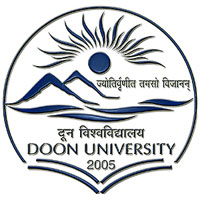 The CFP International Conference on Foreign Language Teaching and Inter Cultural Dialogue (ICFLT&ICD) will be held at the School of Languages at Doon University, Dehradun, Uttarakhand, India during April 10-12, 2013. Foreign language teaching (FLT) and study is witnessing a renaissance in India after its introduction in the universities of Delhi in the 1950s and 1960s. The last decade has seen departments being opened and expanded in all parts of the country. Often they work in tandem with language centers run by the embassies such as those of Japan, Portugal, Italy, Spain, Germany and France who pool resources on the array of teaching methodologies, and sophisticated strategies to attract learners. FLT methodology forms a vital aspect of all language departments and in the last few years there has been a spurt in learner corpora and publications on this subject. More information.
The CFP International Conference on Foreign Language Teaching and Inter Cultural Dialogue (ICFLT&ICD) will be held at the School of Languages at Doon University, Dehradun, Uttarakhand, India during April 10-12, 2013. Foreign language teaching (FLT) and study is witnessing a renaissance in India after its introduction in the universities of Delhi in the 1950s and 1960s. The last decade has seen departments being opened and expanded in all parts of the country. Often they work in tandem with language centers run by the embassies such as those of Japan, Portugal, Italy, Spain, Germany and France who pool resources on the array of teaching methodologies, and sophisticated strategies to attract learners. FLT methodology forms a vital aspect of all language departments and in the last few years there has been a spurt in learner corpora and publications on this subject. More information.

 The Cities Network Campaign, along with All India Institute of Local Self Government (AIILSG) and World resources Institute, India (WRI) is organizing the South Asian Cities Summit 2013 on 17–18 April in New Delhi. The Summit aims to create a platform and bring together mayors & commissioners from various south Asian cities (such as India, Nepal, Bangladesh, Bhutan, etc), subject experts, international/ funding organisations/investors working in the area of climate change, technology providers and European, South Asian & other part of world businesses excelling in the sector to discuss the issues and the way forward and encourage appropriate technology interventions. The delegation of 250-300 participants would include business heads, financial expert and decision makers and would thus initiate business dialogues, collaboration proposals and prospective joint ventures. More information.
The Cities Network Campaign, along with All India Institute of Local Self Government (AIILSG) and World resources Institute, India (WRI) is organizing the South Asian Cities Summit 2013 on 17–18 April in New Delhi. The Summit aims to create a platform and bring together mayors & commissioners from various south Asian cities (such as India, Nepal, Bangladesh, Bhutan, etc), subject experts, international/ funding organisations/investors working in the area of climate change, technology providers and European, South Asian & other part of world businesses excelling in the sector to discuss the issues and the way forward and encourage appropriate technology interventions. The delegation of 250-300 participants would include business heads, financial expert and decision makers and would thus initiate business dialogues, collaboration proposals and prospective joint ventures. More information.
Center for South Asian Studies at the University of Hawaii at Manoa, USA, invites paper and panel proposals on aspects related to its 30th Annual Spring Symposium on “Sensing South Asia”. The conference will take place 15–17 April 2013 in Honolulu.
What happens when we approach social and natural worlds, the body, and affect through the senses? How do disciplinary and interdisciplinary understandings of South Asia change if we consider that what and how we feel, hear, taste, smell, touch, see, and intuit are culturally and historically mediated? The symposium invites scholars, artists, and practitioners to engage with the senses as portals to time, place, and social, cultural, and natural processes in South Asia. Of particular interest is research grounded in sensory relations and intersensory modalities that can generate new questions for various disciplines. In this symposium, the organisers want to explore what South Asian societies – and their histories, philosophies, everyday rituals and practices, and political economies – can offer to emerging theories and methods in sensory studies. Participants are encouraged to perform or use new media as part of their presentations. More information.


 On 23–24 April, The International Institute for Asian Studies (IIAS) organises a seminar on ‘Asian Cities: Colonial to Global’ in Leiden, the Netherlands. The organisers welcome contributions from the fields of architecture, urbanism, geography, area studies, history, linguistics, religious studies, social science, anthropology, etc., but please remember that the point of departure will always be the built environment. Note also that this seminar is not intended to be an investigation into theoretical issues relating to the field of postcolonialism, rather it seeks to investigate more practical issues relating to the more literally ‘post-colonial’ (in the sense of the era following independence from erstwhile colonial or imperial powers), and the effects this has had on the built environment. Contributions are invited that cover the regions of East, Southeast and South Asia (including countries that were not colonized (such as Japan or Thailand) or were only partially colonized (such as China).
On 23–24 April, The International Institute for Asian Studies (IIAS) organises a seminar on ‘Asian Cities: Colonial to Global’ in Leiden, the Netherlands. The organisers welcome contributions from the fields of architecture, urbanism, geography, area studies, history, linguistics, religious studies, social science, anthropology, etc., but please remember that the point of departure will always be the built environment. Note also that this seminar is not intended to be an investigation into theoretical issues relating to the field of postcolonialism, rather it seeks to investigate more practical issues relating to the more literally ‘post-colonial’ (in the sense of the era following independence from erstwhile colonial or imperial powers), and the effects this has had on the built environment. Contributions are invited that cover the regions of East, Southeast and South Asia (including countries that were not colonized (such as Japan or Thailand) or were only partially colonized (such as China).
 Please note that neither the IIAS nor TU Delft will be in a position to help fund contributors’ trips to the seminar. The intention is however to gather a selection of the papers into a book which will be a fully peer-reviewed publication. The seminar series has a good track record at converting previous events into peer-reviewed publications: Seminar number two (Delft 2010) resulted in Aspects of Urbanization in China: Shanghai, Hong Kong, Guangzhou, published by the University of Amsterdam Press in spring 2012, and seminar number three (Shanghai 2011) is currently under peer review and is scheduled to be published as a special issue of Footprint journal in spring 2013. More information.
Please note that neither the IIAS nor TU Delft will be in a position to help fund contributors’ trips to the seminar. The intention is however to gather a selection of the papers into a book which will be a fully peer-reviewed publication. The seminar series has a good track record at converting previous events into peer-reviewed publications: Seminar number two (Delft 2010) resulted in Aspects of Urbanization in China: Shanghai, Hong Kong, Guangzhou, published by the University of Amsterdam Press in spring 2012, and seminar number three (Shanghai 2011) is currently under peer review and is scheduled to be published as a special issue of Footprint journal in spring 2013. More information.

 South Asia Research Cluster at Wolfson College, University of Oxford, UK, organsies an academic workshop entitled ”Juxtapose: Challenges of Comparative Research on Contemporary China and India” on Friday 26 April 2013, 09.00–18.00. Academic papers and online contributions are invited.
South Asia Research Cluster at Wolfson College, University of Oxford, UK, organsies an academic workshop entitled ”Juxtapose: Challenges of Comparative Research on Contemporary China and India” on Friday 26 April 2013, 09.00–18.00. Academic papers and online contributions are invited.
The fascinating tension created by the similarities and differences between the two has attracted a rich multidisciplinary scholarship of SinoIndian comparative work in recent years. Previous attempts at suchcomparative studies have suggested that what and how we compare depends heavily on theoretical approaches dominant in each country. These approaches however, are neither consistent nor cohesive, and given that the global reality is also diverse, it is surprising that we should expect them to be so. How is this theoretical problem to be overcome? Could we form a better comparative framework to understand India and China in our changing world? And if so, then how? This workshop aims to develop a creative platform for the cutting edge of international scholars and practitioners to discuss ongoing and forthcoming comparative projects about these two emerging powers, their challenges and opportunities. More information about the Oxford workshop.

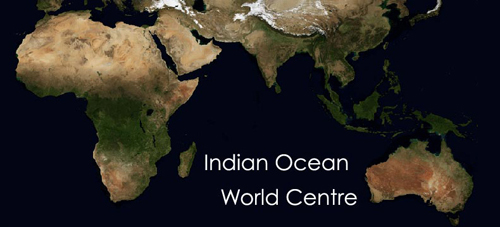 The Indian Ocean World Centre (IOWC) at the McGill University in Montreal, Canada, is organizing a conference on “Histories of Medicine in the Indian Ocean World”, 26-27 April 2013.
The Indian Ocean World Centre (IOWC) at the McGill University in Montreal, Canada, is organizing a conference on “Histories of Medicine in the Indian Ocean World”, 26-27 April 2013.
Papers are invited that address any aspect of medicine in the region of the Indian Ocean, including Northeast, East and South Africa, the Middle East, the Indian Ocean islands, South, Southeast, and East Asia, in any historical period. The aim of the conference is to interrogate the concept of the Indian Ocean as a world using the exchange of medical goods, texts, instruments and ideas as a lens through which to examine how far the region may be regarded as a cultural entity. As well as being an article of trade, medicine is associated with religious, spiritual, and cultural ideas about the body and its relation to the environment. These ideas both govern the acceptance, modification, or rejection of medicines and medical ideas and are altered by them. Medical exchanges can thus be used to provide a cultural perspective on historical events and trends such as the spread of Islam and other faiths, the movement of migrant and diaspora communities, free and enslaved, and the rise and fall of empires in the region. The conference being multidisciplinary, papers from geography, sociology, anthropology and area studies as well as the history of medicine and science are welcome. More information.

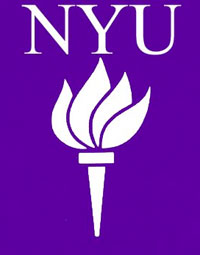 University of Copenhagen, Denmark, and New York University, USA, invite participants to its 3rd Joint Dissertation Workshop to be held in New York City 21–22 June 2013. The theme for the workshop, coordinated by Prof. David Ludden, New York University, and Dr. Ravinder, University of Copenhagen, will be ”Social Mobility, Inequity and City in the Global South”.
University of Copenhagen, Denmark, and New York University, USA, invite participants to its 3rd Joint Dissertation Workshop to be held in New York City 21–22 June 2013. The theme for the workshop, coordinated by Prof. David Ludden, New York University, and Dr. Ravinder, University of Copenhagen, will be ”Social Mobility, Inequity and City in the Global South”.
Cities are focal points for the social mobility and prosperity that signify ‘the rise of the South,’ and also highlight the social immobility and deprivation that produce our planet of slums and agrarian and environmental crises. In this multi-disciplinary dissertation workshop, the focus lies on the inequity of globalization in and around urban centers of the global South, from various theoretical and empirical perspectives, including but not limited to fields of history, sociology, anthropology, political science, political economy and development studies. PhD students who have completed substantial dissertation research on any aspect of urbanized inequity in the world of globalization are invited to discuss their work. Prospective participants should send relevant documents to the organisers by 7 April 2013. See full information.


 In order to gain a more holistic view of the dynamics of change in a society which faces on-going conflict, the Department of Political Science, University of Peshawar, Pakistan hosts an international conference on “Dynamics of Change in Conflict Societies: Pakhtun Region in Perspective”, 25–26 June 2013. It is organised in collaboration with the Hanns Seidel Foundation, Islamabad, and will be held at the Bara Gali Summer Campus of the University of Peshawar.
In order to gain a more holistic view of the dynamics of change in a society which faces on-going conflict, the Department of Political Science, University of Peshawar, Pakistan hosts an international conference on “Dynamics of Change in Conflict Societies: Pakhtun Region in Perspective”, 25–26 June 2013. It is organised in collaboration with the Hanns Seidel Foundation, Islamabad, and will be held at the Bara Gali Summer Campus of the University of Peshawar.
This is the second in a series of conferences by the same organisers – the first one was held in November 2011. The aim is to investigate the dynamism which is associated with the Pakhtun region and society. In order to explore more deeply the critical factors and impacts of change, this second conference will cover new thematic areas relating to the recent dynamics within Pakhtun society.
 The Pakhtun region has witnessed a long history of perpetual war, violence, insecurity and displacements, which profoundly affect the socio-psychological, political and economic conditions of its people. For decades, life within Pakhtun society in the Pakistani provinces of Baluchistan, Khyber-Pakhtunkhwa and Federally Administered Tribal Areas (FATA) has been viewed through the spectrum of social and political upheavals and conflict in Afghanistan. Since 2001, the US and NATO engagement in Afghanistan has added to growing unrest in Pakhtun society. The situation in the Pakhtun region cannot be studied thoroughly when treated in isolation from the broader context of Pakistan. Therefore, scholars are also invited to submit proposals for comparative studies of conflict dimensions in other areas of Pakistan and their connections to the Pakhtun region and society. More information.
The Pakhtun region has witnessed a long history of perpetual war, violence, insecurity and displacements, which profoundly affect the socio-psychological, political and economic conditions of its people. For decades, life within Pakhtun society in the Pakistani provinces of Baluchistan, Khyber-Pakhtunkhwa and Federally Administered Tribal Areas (FATA) has been viewed through the spectrum of social and political upheavals and conflict in Afghanistan. Since 2001, the US and NATO engagement in Afghanistan has added to growing unrest in Pakhtun society. The situation in the Pakhtun region cannot be studied thoroughly when treated in isolation from the broader context of Pakistan. Therefore, scholars are also invited to submit proposals for comparative studies of conflict dimensions in other areas of Pakistan and their connections to the Pakhtun region and society. More information.

 The Centre for Asian Studies of the University of Kelaniya, in collaboration with the International Association for Asian Heritage (IAAH) and the Ministry of Culture and the Arts, invite to an International Conference on “Asian Art, Culture and Heritage”, to be held during 21-23 August, 2013, at the Sri Lanka Foundation Institute, Colombo, Sri Lanka.
The Centre for Asian Studies of the University of Kelaniya, in collaboration with the International Association for Asian Heritage (IAAH) and the Ministry of Culture and the Arts, invite to an International Conference on “Asian Art, Culture and Heritage”, to be held during 21-23 August, 2013, at the Sri Lanka Foundation Institute, Colombo, Sri Lanka.
Abstracts for conference presentations are invited on the following themes: 1. Recent studies in Archaeology; 2. New perspectives in History; 3. Trends in Heritage Management, Museology and Tourism; 4. Critical studies in Religion, Language and Literature; 5. Aspects on Arts, Culture and Society. Abstracts and all other correspondence should be channelled through iaahlanka@yahoo.com which is exclusive for this conference. The deadline for abstract submission is 10 May 2013. More information.
 The New Zealand India Research Institute, established in 2012, will be formally launched with an international conference to be held at Victoria University of Wellington on 28–29 August 2013. The conference is entitled ”Changing India: From Decolonization to Globalization”. It aims to examine critically some of the issues related to changing India’s much talked about economic growth and its evermore globalised position in the 21st Century. The inaugural keynote address to this conference will be delivered by Professor Kaushik Basu, Senior Vice President and Chief Economist, World Bank (until recently Chief Economic Adviser, Ministry of Finance, Government of India). There will also be other eminent special invited speakers. Deadline for submitting abstracts is 15th May 2013. More information.
The New Zealand India Research Institute, established in 2012, will be formally launched with an international conference to be held at Victoria University of Wellington on 28–29 August 2013. The conference is entitled ”Changing India: From Decolonization to Globalization”. It aims to examine critically some of the issues related to changing India’s much talked about economic growth and its evermore globalised position in the 21st Century. The inaugural keynote address to this conference will be delivered by Professor Kaushik Basu, Senior Vice President and Chief Economist, World Bank (until recently Chief Economic Adviser, Ministry of Finance, Government of India). There will also be other eminent special invited speakers. Deadline for submitting abstracts is 15th May 2013. More information.

 A two-day nternational Conference on ”Regional Towns and Migration: Interrogating Transnationalism and Development in South Asia” is being held 10–11 October 2013 at the University of Amsterdam. It is being organised by the Provincial Globalisation Programme, a joint collaborative research programme by by the Amsterdam Institute for Social Science Research (AISSR) in the Netherlands, and the National Institute of Advanced Studies (NIAS) in Bangalore. Conference conveners are Prof. Carol Upadhya, NIAS; and Prof. Mario Rutten, AISSR.
A two-day nternational Conference on ”Regional Towns and Migration: Interrogating Transnationalism and Development in South Asia” is being held 10–11 October 2013 at the University of Amsterdam. It is being organised by the Provincial Globalisation Programme, a joint collaborative research programme by by the Amsterdam Institute for Social Science Research (AISSR) in the Netherlands, and the National Institute of Advanced Studies (NIAS) in Bangalore. Conference conveners are Prof. Carol Upadhya, NIAS; and Prof. Mario Rutten, AISSR.
 ProGlob explores transnational flows of migrant resources into India through a series of regional-level studies centred on ‘provincial’ towns and their rural hinterlands. its aim is to develop a fresh perspective on questions of migration and development in contemporary India. The aim is to develop a fresh perspective on questions of migration and development in contemporary India and the conference will gather scholars from a range of disciplines and interdisciplinary areas who are working in different regions of South Asia on topics that fall within the 6 broad thematic areas of the conference: 1. Region-specific patterns and histories of international migration and the local impacts of remittances and investments by migrants or diasporic groups; 2. Regional diaspora philanthropy; 3. Transnational politics of development and/ or the environment; 4. Transnationalism and regional identity politics; 5. Formation of regional transnational networks / communities; and 6. Conceptual / theoretical papers on rethinking the region in South Asia in the context of globalisation and transnational flows.
ProGlob explores transnational flows of migrant resources into India through a series of regional-level studies centred on ‘provincial’ towns and their rural hinterlands. its aim is to develop a fresh perspective on questions of migration and development in contemporary India. The aim is to develop a fresh perspective on questions of migration and development in contemporary India and the conference will gather scholars from a range of disciplines and interdisciplinary areas who are working in different regions of South Asia on topics that fall within the 6 broad thematic areas of the conference: 1. Region-specific patterns and histories of international migration and the local impacts of remittances and investments by migrants or diasporic groups; 2. Regional diaspora philanthropy; 3. Transnational politics of development and/ or the environment; 4. Transnationalism and regional identity politics; 5. Formation of regional transnational networks / communities; and 6. Conceptual / theoretical papers on rethinking the region in South Asia in the context of globalisation and transnational flows.
The selected authors will be invited to develop original papers for presentation at the conference and possible inclusion in a planned conference volume or special journal issue. Invited participants will be provided accommodation during the conference and limited funds for travel are available for those who may require support. The deadline for submission of abstracts is 15 April 2013. More information.
 The Leiden University Institute for Area Studies (LIAS) in the Netherlands and its South Asian Studies programme organise a conference on the theme of “South Asia and the Long 1930s: Appropriations and Afterlives”, to be held during 6-7 December 2013. Placing a particular focus on the political, social, cultural and ideological currents of 1930s, the organisers wish to bring together South Asianists across disciplines, to both contextualise the international flow of ideas, commodities and affinities that marked this interwar period, and rethink the afterlives of the 1930s in the unfolding dialectics of decolonisation in South Asia. Abstracts are welcomed that will comment on the layers, dimensions and fluidities of the period, focussing on three key themes: The Market and the Ordinary; International Affinities; and Aesthetics and Politics.
The Leiden University Institute for Area Studies (LIAS) in the Netherlands and its South Asian Studies programme organise a conference on the theme of “South Asia and the Long 1930s: Appropriations and Afterlives”, to be held during 6-7 December 2013. Placing a particular focus on the political, social, cultural and ideological currents of 1930s, the organisers wish to bring together South Asianists across disciplines, to both contextualise the international flow of ideas, commodities and affinities that marked this interwar period, and rethink the afterlives of the 1930s in the unfolding dialectics of decolonisation in South Asia. Abstracts are welcomed that will comment on the layers, dimensions and fluidities of the period, focussing on three key themes: The Market and the Ordinary; International Affinities; and Aesthetics and Politics.
Abstracts of approximately 300 words and a short biographical note are welcomed before 15th April 2013. The organisers aim to provide accommodation and meals for all selected speakers and a limited budget for travel will also be available, for which graduate students will receive priority. More information.
 The 5th Biannual Gujarat Studies Association (GSA) Conference on “(Re)Defining Gujarati Identity” will be held 19-20 February 2014 in Ahmedabad, Gujarat, India. Keynote speaker will be Dr. Eiluned Edwards of Nottingham Trent University.
The 5th Biannual Gujarat Studies Association (GSA) Conference on “(Re)Defining Gujarati Identity” will be held 19-20 February 2014 in Ahmedabad, Gujarat, India. Keynote speaker will be Dr. Eiluned Edwards of Nottingham Trent University.
The notion of identity has come to be recognised as the key to understanding individuals and their relationships with others, which are often based on shared belonging and differences, thereby creating boundaries, to make sense of our world. This conference aims to (re)define the identities and/or representations of Gujaratis, both within and outside India.
Abstracts in English are invited for papers from academics in all areas of study for an inter-disciplinary conference that addresses various aspects of Gujarati identity including, but not limited to: Local and/or Global Identities, Minority and/or Majority Dynamics, Cross-Cultural Interactions, Identity in Crisis, Material Culture, Spatial Identities, Literary Identities, The Gujarati Language, Historical and/or Contemporary Perspectives, Cultural Life, Religion and Spirituality, Femininities and/or Masculinities, Life in the Gujarati Diaspora/Post-diaspora, Collective Memory and Historiography.
Submissions are encouraged from graduate and post-graduate students. A limited number of student bursaries are available for master’s level, doctoral and post-doctoral candidates presenting papers at the conference. Abstract submission deadline / bursary application deadline is 9 September 2013. More information.
• Other conferences connected to South Asian studies all over the World
See SASNET’s page, http://www.sasnet.lu.se/conferences/conferences
South Asia related culture in Scandinavia
New and updated items on SASNET web site
• Swedish departments where research on South Asia is going on
Constantly added to the list of research environments at Swedish universities, presented by SASNET. The full list now includes nearly 300 departments, with detailed descriptions of the South Asia related research and education taking place! See the full list of departments here: http://www.sasnet.lu.se/institutions/reserch-environments
• Useful travelling information
Look at our Travel Advice page. Updated travel advises from the The British Foreign & Commonwealth Office about safety aspects on travelling to the countries of South Asia.
Best regards
Lars Eklund
Deputy director/webmaster
SASNET/Swedish South Asian Studies Network

 The Swedish South Asian Studies Network (SASNET), the Nordic Centre in India (
The Swedish South Asian Studies Network (SASNET), the Nordic Centre in India (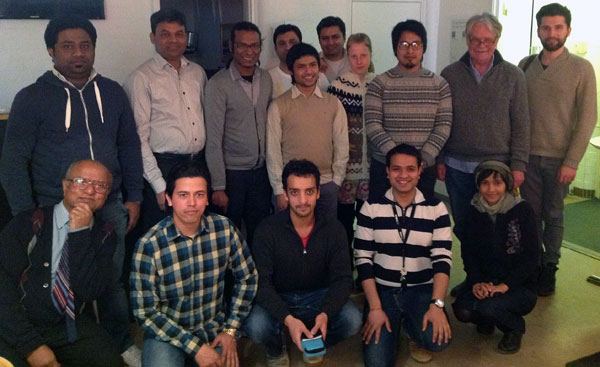 A
A fter a SASNET organised meeting held on Tuesday 19th March 2013, a group of students at Lund University decided to form the South Asian Students Association (SASA). The new forum is open for students coming from the South Asian countries studying at Lund University, but also for Swedish and other International students/researchers with an academic interest in South Asia. Besides, the door is open for students also at neighbouring universities.
fter a SASNET organised meeting held on Tuesday 19th March 2013, a group of students at Lund University decided to form the South Asian Students Association (SASA). The new forum is open for students coming from the South Asian countries studying at Lund University, but also for Swedish and other International students/researchers with an academic interest in South Asia. Besides, the door is open for students also at neighbouring universities. The interim SASA coordinator Hawwa Lubna, student at the Bachelor of Science Programme in Development Studies (BIDS), and SASNET’s Maldivian resource person at Lund University, then explained the purpose of the new forum to be the creation of a student community representing all nations of South Asia, that will organise meetings, film shows and cultural events by itself, and at the same time work closely together with SASNET.
The interim SASA coordinator Hawwa Lubna, student at the Bachelor of Science Programme in Development Studies (BIDS), and SASNET’s Maldivian resource person at Lund University, then explained the purpose of the new forum to be the creation of a student community representing all nations of South Asia, that will organise meetings, film shows and cultural events by itself, and at the same time work closely together with SASNET.
 In connection to the Bangalore workshop on Urbanisation and Migration in Transnational India, jointly organised by SASNET, Nordic Centre in India (NCI), and Institute for Social and Economic Change (ISEC), 5–7 March 2013 (
In connection to the Bangalore workshop on Urbanisation and Migration in Transnational India, jointly organised by SASNET, Nordic Centre in India (NCI), and Institute for Social and Economic Change (ISEC), 5–7 March 2013 ( On Monday 4 March 2013, Lars visited the prestigious National Institute of Advanced Studies (NIAS) at its premises within the Indian Institute of Science (IISc) campus, meeting its Director, Professor V S Ramamurthy, well known Indian nuclear scientist, and a number of other distinguished fellow researchers working in various fields both in Social Sciences and Science/Technology. From there, Lars proceeded to Srishti University of Art, Design and Technology, located in Yelahanka in north Bangalore. Shrishti has had fruitful collaboration with the School of Arts and Communication (K3) at Malmö University for eight years, and recently a collaboration has also been established with University of Gothenburg. A meeting was arranged with the key persons behind these inititatives.
On Monday 4 March 2013, Lars visited the prestigious National Institute of Advanced Studies (NIAS) at its premises within the Indian Institute of Science (IISc) campus, meeting its Director, Professor V S Ramamurthy, well known Indian nuclear scientist, and a number of other distinguished fellow researchers working in various fields both in Social Sciences and Science/Technology. From there, Lars proceeded to Srishti University of Art, Design and Technology, located in Yelahanka in north Bangalore. Shrishti has had fruitful collaboration with the School of Arts and Communication (K3) at Malmö University for eight years, and recently a collaboration has also been established with University of Gothenburg. A meeting was arranged with the key persons behind these inititatives. Two days later, on Wednesday 6 March 2013, Lars made a tour to Electronics City, east of Bangalore, to visit two premier research institutions located there, namely the International Institute of Information Technology Bangalore (IIITB), and the newly established Azim Premji University.
Two days later, on Wednesday 6 March 2013, Lars made a tour to Electronics City, east of Bangalore, to visit two premier research institutions located there, namely the International Institute of Information Technology Bangalore (IIITB), and the newly established Azim Premji University.
 Dr. Aneeta Rajendran, Department of English,
Dr. Aneeta Rajendran, Department of English,  Dr. Astri Suhrke, senior researcher at the
Dr. Astri Suhrke, senior researcher at the 
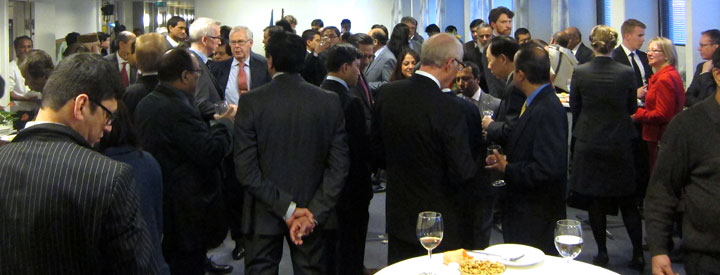

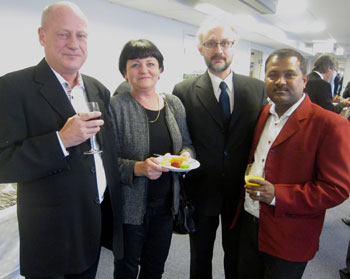


 Lars also visited the Embassy of Pakistan to meet the new Pakistani Ambassador to Sweden, Mr. Sajjad Kamran (photo to the left), who came to Sweden only two weeks earlier. They discussed existing collaboration between Swedish and Pakistani academic institutions, and the coming visit of the Ambassador to the SASNET South Asia Symposium at Lund University on April 24th (
Lars also visited the Embassy of Pakistan to meet the new Pakistani Ambassador to Sweden, Mr. Sajjad Kamran (photo to the left), who came to Sweden only two weeks earlier. They discussed existing collaboration between Swedish and Pakistani academic institutions, and the coming visit of the Ambassador to the SASNET South Asia Symposium at Lund University on April 24th (


 Five Bangladeshi writers – Nirmalendu Goon, Ruby Rahman, Muhammad Samad, Mrittika Goon and Anisur Rahman – will be prominent participants at the
Five Bangladeshi writers – Nirmalendu Goon, Ruby Rahman, Muhammad Samad, Mrittika Goon and Anisur Rahman – will be prominent participants at the 
 The Social Sciences Students Union (Samhällsvetarkåren) at Lund Universuty invites to a Development Documentary Night, on Thursday 4 April 2013, at 19.30. The film ”Unwanted Pregnancies – Stories from Maldives” will be shown. Venue: Palaestra, Universitetsplatsen, Lund.
The Social Sciences Students Union (Samhällsvetarkåren) at Lund Universuty invites to a Development Documentary Night, on Thursday 4 April 2013, at 19.30. The film ”Unwanted Pregnancies – Stories from Maldives” will be shown. Venue: Palaestra, Universitetsplatsen, Lund.
 The first novel by Bangladeshi born writer Dilruba Z. Ara, now living in Lund, Sweden – ”A List of Offences” – has now been published in paperback by Chamon Publishing House in Los Angeles. It was originally published in 2006 in Dhaka, Bangladesh by University Press Limited, and has later been translated into Spanish, becoming a bestseller in parts of South America, and in Greek language. Although the English-language version has been available only in Dhaka, it has been reviewed in several countries and studied at various universities. Ara is also the author of many short stories, published to great acclaim in many international anthologies and used as course material in universities around the world. The novel focuses on a lush Bengali village, where a much-longed-for daughter is born with hair the color of sunlight on the river. The shock of the child’s silvery hair makes the midwife wet herself in the birthing room – an omen for village gossip. A life of misfortune is predicted for the baby girl Daria, who grows up not wholly unaffected by the rumors that circulate around her village every time she does anything unusual.
The first novel by Bangladeshi born writer Dilruba Z. Ara, now living in Lund, Sweden – ”A List of Offences” – has now been published in paperback by Chamon Publishing House in Los Angeles. It was originally published in 2006 in Dhaka, Bangladesh by University Press Limited, and has later been translated into Spanish, becoming a bestseller in parts of South America, and in Greek language. Although the English-language version has been available only in Dhaka, it has been reviewed in several countries and studied at various universities. Ara is also the author of many short stories, published to great acclaim in many international anthologies and used as course material in universities around the world. The novel focuses on a lush Bengali village, where a much-longed-for daughter is born with hair the color of sunlight on the river. The shock of the child’s silvery hair makes the midwife wet herself in the birthing room – an omen for village gossip. A life of misfortune is predicted for the baby girl Daria, who grows up not wholly unaffected by the rumors that circulate around her village every time she does anything unusual. 
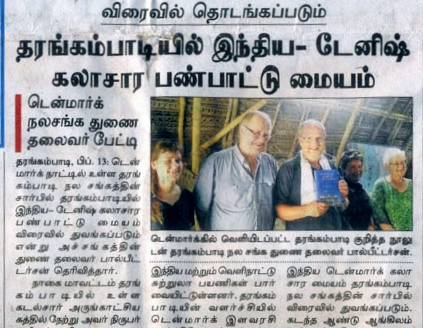 book entitled “All Religions Merge in Tranquebar – Religious Coexistence and Social Cohesion in South India” written by Oluf Schönbeck together with Peter B. Andersen has been released by
book entitled “All Religions Merge in Tranquebar – Religious Coexistence and Social Cohesion in South India” written by Oluf Schönbeck together with Peter B. Andersen has been released by